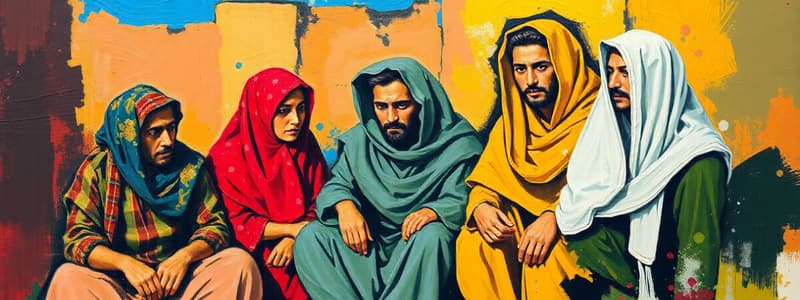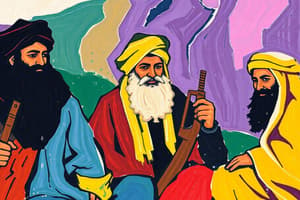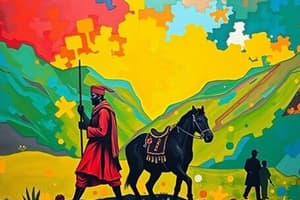Podcast
Questions and Answers
What was the primary method used by Fazlullah to enforce his edicts and exert control over the population?
What was the primary method used by Fazlullah to enforce his edicts and exert control over the population?
- Implementing economic sanctions and trade embargoes against those who defied his authority.
- Establishing religious councils to mediate disputes and ensure compliance with Sharia law.
- Disseminating his decrees through radio broadcasts and employing enforcers to monitor and punish violations. (correct)
- Organizing public debates and forums to persuade the populace to voluntarily adhere to his interpretations of Islamic law.
How did Malala's family respond to the increasing influence and threats of the Taliban in their community?
How did Malala's family respond to the increasing influence and threats of the Taliban in their community?
- They publicly denounced the Taliban's ideology and openly challenged their authority, despite the potential risks.
- They actively participated in public demonstrations and protests against the Taliban's policies and actions.
- They maintained a semblance of normalcy by engaging in intellectual discussions and preserving their cherished forms of entertainment in secrecy. (correct)
- They sought refuge in neighboring countries, seeking asylum from the escalating violence and oppression.
What was the symbolic significance of the Khushal School's decision to rotate seating arrangements among students?
What was the symbolic significance of the Khushal School's decision to rotate seating arrangements among students?
- It served as a practical method for optimizing classroom space and ensuring equitable access to learning resources.
- It was primarily intended to improve classroom discipline and reduce instances of disruptive behavior.
- It aimed to foster closer bonds of friendship and camaraderie among students from different social backgrounds.
- It represented a subtle act of defiance against the Taliban's discriminatory policies by affirming the principle of equality among all girls. (correct)
What does the act of burning TVs, DVDs and CDs symbolize in the context of the Taliban's rule?
What does the act of burning TVs, DVDs and CDs symbolize in the context of the Taliban's rule?
How did the local population react to the Taliban's ban on women in public places, and what does this reveal about the community's values and priorities?
How did the local population react to the Taliban's ban on women in public places, and what does this reveal about the community's values and priorities?
What motivated Fazlullah to prohibit women from watching movies and TV shows?
What motivated Fazlullah to prohibit women from watching movies and TV shows?
What does Malala mean when she says that Mingora had become like a prison?
What does Malala mean when she says that Mingora had become like a prison?
How does the text portray the role and impact of Radio Mullah (Fazlullah) on the community?
How does the text portray the role and impact of Radio Mullah (Fazlullah) on the community?
What does Malala's question, "How did an unschooled fanatic turn himself into a kind of radio god? And why was no one prepared to defy him?" reveal about her perspective on the situation?
What does Malala's question, "How did an unschooled fanatic turn himself into a kind of radio god? And why was no one prepared to defy him?" reveal about her perspective on the situation?
In what ways did the dinner conversations in Malala's family contribute to her resilience and resistance against the Taliban's oppressive regime?
In what ways did the dinner conversations in Malala's family contribute to her resilience and resistance against the Taliban's oppressive regime?
Flashcards
Tehrik-i-Taliban-Pakistan (TTP)
Tehrik-i-Taliban-Pakistan (TTP)
A militant group in Pakistan opposing the government and enforcing strict interpretations of Islam.
Fazlullah
Fazlullah
Leader of TTP, known for enforcing bans on women in public and media.
Enforcement of bans
Enforcement of bans
The act of ensuring compliance with rules or laws, particularly the ban on women in public places.
Impact on women
Impact on women
Signup and view all the flashcards
Public square burnings
Public square burnings
Signup and view all the flashcards
Radio Mullah
Radio Mullah
Signup and view all the flashcards
Democratic classroom
Democratic classroom
Signup and view all the flashcards
Fear and cowering at home
Fear and cowering at home
Signup and view all the flashcards
Khushal School
Khushal School
Signup and view all the flashcards
Mingora's transformation
Mingora's transformation
Signup and view all the flashcards
Study Notes
Family Life Under Taliban Rule
- The author's family experienced daily life under Taliban rule, experiencing restrictions and fear.
- Their family's dinner conversations were about philosophical topics like Einstein and Newton.
- The author's brothers and she fought over the remote control.
- The Taliban banned women from public places and restricted family activities.
- The family's male members had to control women and children.
- The narrator and her brothers were frightened of being punished.
Television and the Taliban
- The family's beloved television was banned by Fazlullah.
- The family had to hide their TV in a closet.
- The author asked her father if they would have to burn their television.
- The author's brother felt TV was forbidden, but they still watched it.
- The Taliban leader felt that watching television was a sin.
Educational Experiences
- The Taliban banned women from public places.
- Women were afraid to go out, and DVD shops closed because of that.
- The Khushal School carried on as usual, with some students leaving.
- The school appreciated that teaching went on despite restrictions.
- Students had a discussion about running the classroom in a democratic way.
- Students agreed to switch seats every week.
- The experience was a small way of saying everyone is equal.
- The school, however, was like a prison.
Studying That Suits You
Use AI to generate personalized quizzes and flashcards to suit your learning preferences.
Description
This explores family life under Taliban rule, marked by restrictions, fear, and the banning of television. The family navigates daily life while addressing philosophical topics and dealing with the challenges of living in a restrictive environment. Educational experiences were limited due to the Taliban's ban on women in public.




